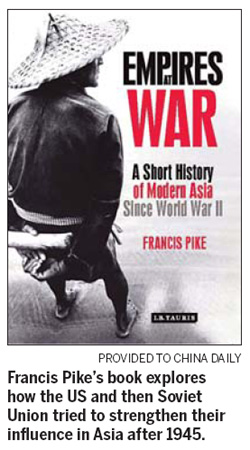Asia was no naive target of 'big two'

Francis Pike's voluminous tome (860 pages, a bibliography with more than 800 entries), is a jaw-dropping feat in terms of the sheer range it covers.
Empires at War: A Short History of Modern Asia Since WWII (IB Tauris) is an insightful commentary on how the US-Soviet wrangling to exert power and influence over Asia panned out after 1945, and how the 14 major nations in the region responded to it.
Pike, a British scholar-historian and journalist who has lived and worked in Japan, China and India for 20 years, combines scholarship, pace and clarity in talking about milestone events and legendary figures of world history in the 20th century - investing the over-familiar with an unambiguous charm.
Pike's claim in the concluding chapter that American economic hegemony over most of Asia ever since the collapse of the Soviet bloc in the 1980s "saved large swathes of the world from the impoverishing tyranny of communism" might be an abrupt way to end this story. Especially given that China's holdings of US treasury debts is second only to that of Japan's even after the recent drastic cutbacks.
By "shielding Asia", Pike says, by making its "liberal democratic and economic values globally dominant", America "made its own empire increasingly redundant". That America's place as the world superpower is not as indisputable as it used to be might well have been caused by reasons other than its generosity in disseminating the idea of liberal democracy.
Having said that, Pike has dexterously managed to put together the stories of the key players in Asian politics - Mao Zedong, MK Gandhi, Sukarno, Ho Chi Minh, Kim Il Sung, Aung San, Mujibur Rahman, Corazon Aquino, Lee Kuan Yew, among others - between two covers, sometimes taking a slightly atypical view of larger-than-life characters who are either lionized or consigned to notoriety.
The value of this book lies in reaffirming the fact that even as America and the then Soviet Union squabbled and tensed over their share of the Asian pie, played games about whom to befriend and/or blacklist, some of the Asian nations were evolved enough to throw these overtures/pressure tactics right back at them.
The story of how American President Richard Nixon and his chosen emissary Henry Kissinger - "the Harvard intellectual and strategy wonk" - consistently wooed China with a missionary zeal, culminating in Nixon's 1971 visit, is a case in point.
"If there is anything I can do before I die, it is to go to China," Nixon told TIME magazine. "It was perhaps the most important geopolitical event of the second half of the 20th century," writes Pike, having, supposedly, ruptured China's alliance with the Soviet Union, creating a new global power equation.
China Daily
(China Daily 04/16/2010 page19)














